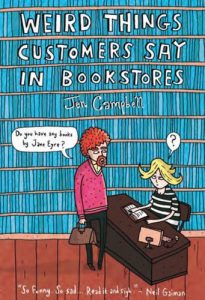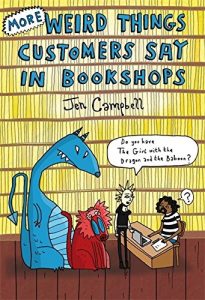Secrets Kids Know (that adults oughta learn) by Allen Klein
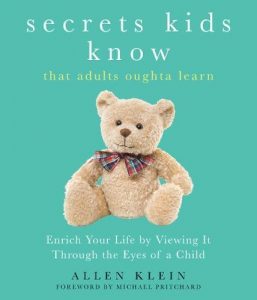 My guilty morning secret (now that I’m retired) is I’ll often make a cup of tea and go back to bed to read for a bit. That’s how I enjoyed Secrets Kids Know over the last several weeks. Turned out to be a delightful way to start my day.
My guilty morning secret (now that I’m retired) is I’ll often make a cup of tea and go back to bed to read for a bit. That’s how I enjoyed Secrets Kids Know over the last several weeks. Turned out to be a delightful way to start my day.
I’m usually not a huge fan of the self-help genre, I find they regurgitate one simple principal over and over to fill pages. But this is not the case with Secrets Kids Know.
The overall premise is as adults grow up we loose our joy in life. Which affects many aspects of our lives, from our relationships, to our careers and creativity. Mr. Klein helps the reader see a wide variety of things through children’s eyes — with his delightful insights, quotes, examples, and stories.
Each chapter (or secret as Mr. Klein calls them) is a breath of fresh air, here’s a brief sampling:
Be a Beginner, where we see how the innocence of not knowing something opens us up to all possibilities – without preconceived right or wrong.
Be a Fun Seeker, in which we see how clowning around like a kid can be restorative.
Be Curious, which asks us to use curiosity to inspire our goals. The child-like question “are we there yet?” can be turned around on yourself “Am I there yet?” or your company “Are we there yet?”
Be Truthful, where we learn how to see things as they are, and the value of honest observation, unclouded by adult preconceptions.
Each chapter ends with a “Grow Down” (vs. Grow up) assignment — more of a suggestion really — such as taking a nap, blowing bubbles out the car window during a traffic jam (gonna try that one), or consulting your child-like instinct when making important decisions.
I fear I’ve made Secrets Kids Know sound simplistic — it not. The author recognizes that adult pressures, worries, and crises can’t be solved by being childlike. We can’t always live in the moment, as if a three year old. Instead, Mr. Klein suggests that we incorporate child-like tendencies into our day-to-day thoughts and activities in order to cope with the burdens of adulthood, not to mention the nightly news.
Something as profound as being present – a Buddhist teaching I’ve long struggled with, was made relevant to my adult life with this quote:
One of the reasons children are filled with extraordinary amounts of energy and enthusiasm may be that they are in the present moment. Their energy is not wasted on a wandering mind that exhausts itself through negative emotions.
Emma Seppala
Unlike some other self help authors, Mr. Klein is no egotist. He happily intersperses his writing with other’s stories, quotes, and insights – often causing this reader to chuckle…
One good thing about five-year-olds is they are always just a Krazy Straw and some chocolate milk away from the best day ever.
Simon Cholland
Mr. Klein is a Jollytologist® (yes he trademarked it), is a professional speaker, and has written a number of books on using humor in our personal and professional lives — to motivate, harness creativity, and heal.
While I won’t be donning a red clown nose (something the author advocates), I did refresh my walking music with some Bee Gees, helped a neighbor’s 1 1/2 year old with a chalk drawing on the sidewalk, and, yes, I’ll be buying bubbles.
Thank you to Viva Editions and the author for providing me with a copy of the book in exchange for an honest and non-compensated review.
For the Love of Bookshops
Just as I am drawn to books about books, I also can’t pass up a book about bookshops.
Like most bibliophiles, I am physically unable to walk past a bookstore of any sort. Even when traveling, where the books are in another language, where there’s nothing I can comprehend, I still have to wander into the bookshops. Just to look around and breathe the smell of books. (Husband is the same way with hardware stores – and yes, I tolerantly tag along. But, between you and me, how many drill bits can one guy use? Whoops, better not go there, looking around at the results of my own book addiction habit)
A friend brought The Bookshop Book back from a trip to the U.K. and passed it on to me as a Christmas gift. This sexy British publication has been sitting next to my reading chair even since, enticing me –whispering in my ear. So the other night I finally succumbed.
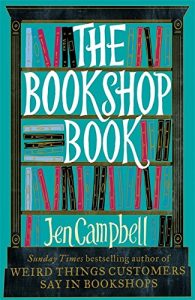 Jen Campbell is a British poet, author and book reviewer, who has a wonderful video blog on YouTube where she talks about her favorite books.
Jen Campbell is a British poet, author and book reviewer, who has a wonderful video blog on YouTube where she talks about her favorite books.
I’ve become rather addicted to seeing my favorite book bloggers on their video blogs (Vlogs). Simon has done the same here. Don’t hold your breath, Book Barmy will stay as is. The world is not ready for videos with my mug yacking on about books. Nor am I, I’d have to fix my crazy hair, do something involving makeup and don a video worthy shirt.
But I digress – back to The Bookshop Book, how could I resist its siren call after reading this from the book’s front flap?:
Every bookshop has a story.
We’re not talking about rooms that are just full of books. We’re talking about bookshops in barns, disused factories, converted churches and underground car parks. Bookshops on boats, on buses, and in old run-down train stations. Fold-out bookshops, undercover bookshops, this-is-the-best-place-I’ve-ever-been-to-bookshops.
Meet Sarah and her Book Barge sailing across the sea to France. Meet Sebastien, in Mongolia, who sells books to herders of the Altai mountains. Meet the bookshop in Canada that’s invented the world’s first antiquarian book vending machine.
And that’s just the beginning.
From the oldest bookshop in the world, to the smallest you could imagine, The Bookshop Book examines the history of books, talks to authors about their favourite places, and looks at over three hundred weirdly wonderful bookshops across six continents (sadly, we’ve yet to build a bookshop down in the South Pole).
The Bookshop Book is a love letter to bookshops profiling the famous, such as Shakespeare and Company in Paris and Powell’s in Portland, Oregon, but also some smaller, lesser know shops around the world.
Ms. Campbell also profiles many of the bookshop owners, whom prove to be a wonderfully diverse and quirky lot — many of whom I would love to share a cup of tea and a chat. Authors talk about their favorite bookstores and there’s little snippets of interesting bookish facts.
It was most encouraging to learn that, in this digital age, bookshops around the world continue to survive and in many cases, thrive.
This book had me at hello.
Ms. Campbell is also the author of these two fun books:
These books have a special place in my heart as I work/volunteer at the wonderful Readers Bookstore. Working in the store proves to be one of my favorite things, largely because of the customers who come in searching for their next book. Often they have a book in mind, but can’t remember the title or even the author, but try and describe it based on what they do know about the book. “It’s about a man who lived with elephants for a year”…or, “you know it’s on the bestseller list, about a crocodile?” 
It’s always a challenge and a delightful victory to finally figure out what book they mean.
Ms. Campbell also worked at in a bookshop for many years and turned these often bazaar conversations into two very funny, quickly readable, books.
Both Weird Things Customers Say in Bookstores books celebrate not only bookstores, but the underpaid yet dedicated booksellers who lovingly help the myriad of colorful characters who walk through their doors everyday.
I will now quote from the books, but this is only a small taste of the very fun you’ll have reading these cheerful books:
~~~~~~~~~~~
CUSTOMER: Did Charles Dickens ever write anything fun?
~~~~~~~~~~~~
CUSTOMER: Doesn’t it bother you, being surrounded by books all day? I think I’d be paranoid they were all going to jump off the shelves and kill me.
~~~~~~~~~~~~
CUSTOMER: Do you have a copy of Jane Eyre?
BOOKSELLER: Actually, I just sold that this morning, sorry!
CUSTOMER: Oh. Have you read it?
BOOKSELLER: Yes, it’s one of my favourite books.
CUSTOMER: Oh, great (sits down beside bookseller). Could you tell me all about it? I have to write an essay on it by tomorrow.
~~~~~~~~~~~~
CUSTOMER: Hi, I just wanted to ask: did Anne Frank ever write a sequel?
~~~~~~~~~~~~
CUSTOMER: (an elderly woman) I can’t believe everybody’s reading this Fifty Shades book
BOOKSELLER: I know. I take it it isn’t your cup of tea, then?
CUSTOMER: Oh, no dear; been there, done that – no need to read about it!
~~~~~~~~~~~
CUSTOMER: I read a book in the sixties. I don’t remember the author, or the title. But it was green, and it made me laugh. Do you know which one I mean?”
~~~~~~~~~~~~
CUSTOMER: (holding up a book): What’s this? The Secret Garden? Well, it’s not so secret now, is it, since they bloody well wrote a book about it!
~~~~~~~~~~~~
(I’ve been getting versions of this question a great deal lately…)
CUSTOMER: I really don’t like the planet today – can you recommend a book set far, far away?
~~~~~~~~~~~~~
(with this, I happen to agree…)
CUSTOMER: It makes me sad that grown up books don’t have pictures in them. You’re brought up with them when you’re younger, and then suddenly they’re all taken away
~~~~~~~~~~~~~
(and a personal favorite…)
MOTHER: If you want to buy a book you’ll have to use your own money. I’ve bought you enough books already!
DAUGHTER: But I’ve read all those books!
MOTHER: Well then, you should learn to read slower!
Nice dedication by Ms. Campbell for the second book:
For bookshop customers, booksellers, librarians, bookworms, book-hoarders, bookworms and librocubicularists (those who like to read in bed).
You’re in for a treat with any of Ms. Campbell’s bookshop books.
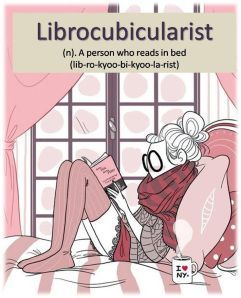 And, now a fond good night to my fellow librocubicularists out there.
And, now a fond good night to my fellow librocubicularists out there.
The $64 Tomato by William Alexander
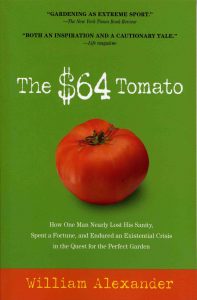 I’ve been perusing seed catalogs for our four little vegetable beds. Despite our summer fog, our little garden gives us fresh lettuce, peas, greens and herbs most of the year. Once we get our first taste of our own garden salad made from heirloom lettuces and organic herbs, we decide it’s all worth it. Be damned the slugs, the mold from the fog, the time, effort and mostly the cost.
I’ve been perusing seed catalogs for our four little vegetable beds. Despite our summer fog, our little garden gives us fresh lettuce, peas, greens and herbs most of the year. Once we get our first taste of our own garden salad made from heirloom lettuces and organic herbs, we decide it’s all worth it. Be damned the slugs, the mold from the fog, the time, effort and mostly the cost.
So, with visions of fresh peas and lettuce dancing in my head, I picked up this slim little book, sitting on my shelf for years now. The $64 Tomato is for gardeners and wannabe gardeners alike — and the subtitle says it all:
How One Man Nearly Lost His Sanity, Spent a Fortune, and Endured an Existential Crisis in the Quest for the Perfect Garden
This is a unvarnished, honest look at what it means to maintain a garden when everything seems against you, and your dreams and plans vastly outrun the available time. But, like all hopeful gardeners, Mr. Alexander gamely plows ahead. (pun intended, couldn’t resist — I’m here all week, tip your waitress)
I laughed my way through this quirky memoir, reading about Mr. Alexander’s 2,000 sq. foot Hudson Valley vegetable garden, a fruit tree orchard and even his attempts to recreate a Swiss-style wildflower meadow on the property.
There’s a spooky handyman who bears a striking resemblance to Christopher Walken, a crew of exasperating contractors, and a menagerie of groundhogs, deer, Japanese beetles and crop destroying worms. These pests, both insect and mammal, defy Mr. Alexander at every turn. They come, they see his garden, and they conquer. His efforts to eradicate those pests (and yes, eradicate means exactly what you think) involve a mean 6,000-volt electric fence (really?) and harken back to that male-favorite film Caddyshack.
But throughout, we do see that Mr. Alexander does actually recognize the joy from his efforts:
Gardening is, by its very nature, an expression of the triumph of optimism over experience.
You gotta feel for this guy, there are the vacations that had to be planned around the harvest, the near electrocution of the tree man, the limitations of his middle-aged body, and the judgment of his wife and kids.
Mr. Alexander’s cost-benefit analysis included every cost — from seed ordered by the pound, to the live animal traps and then amortizing it over the entire life of his garden — results in a staggering $64* to grow each of his prized Brandywine tomatoes. (They sound wonderful, nothing like a homegrown tomato – but yes $64 seems extraordinary.)
But as any gardener will tell you, the pleasure of growing fresh food for friends and family — well that’s priceless.
*Another reviewer (obviously an economics major) pointed out that Mr. Alexander puts the entire costs of his garden on the poor tomato. This reviewer suggested he should have evaluated all crops at market value, taken that number and subtracted it from total expenditures, and then use the difference as a percentage of total expenditures to be applied as a markup percentage to the market value of the Brandywines equally with other crops.
In other words — don’t blame the tomato.
Mr. Alexander has also written several other books…all revealing his obsessive tendencies. I plan on reading both of these next:
52 Loaves in which our hero attempts to recreate a perfect loaf of bread from scratch: growing, harvesting, winnowing, threshing, and milling his own wheat, and
Flirting with French: How a Language Charmed Me, Seduced Me, and Nearly Broke My Heart. Mr. Alexander’s struggle to master a foreign language after age 50.
I like this guy, he’s my sort of geek, obsessive yet funny — outlandish, yet self depreciating. I would love to chat an afternoon away with him – preferably in the garden.
So, Mr. Alexander, if you’re reading this, you have an open invitation to stop by for a cup of coffee — or perhaps a salad — you can bring the tomatoes.
Lisa Scottoline
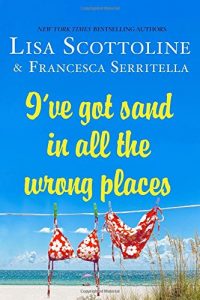 If you’re a follower of Book Barmy, you may have surmised I’m not always a high-brow reader. Yes, I read important books and am working through several classics (Trollope you’re killing me, buddy), but some evenings I just want to zone out, with some plain light-hearted fun.
If you’re a follower of Book Barmy, you may have surmised I’m not always a high-brow reader. Yes, I read important books and am working through several classics (Trollope you’re killing me, buddy), but some evenings I just want to zone out, with some plain light-hearted fun.
You may know Lisa Scottoline as the Edgar-Award winning author of twenty plus NY Times bestselling crime novels. I’ve never read any of those, instead I know her for her series of humor books. I’ve Got Sand In All the Wrong Places marks the seventh in this very funny series.
I find it impressive that Ms. Scottoline can write both page-turning legal thrillers (she practiced as a lawyer before becoming a writer) as well as this series of hilarious and witty books. The material for these laugh-out-loud books derives from a Sunday column that Ms. Scottoline and her daughter, Francesca write for the Philadelphia Inquirer. Each short chapter is a column from the paper written separately by either mother or daughter and each year a new book is derived from the year’s columns. (Obviously Ms. Scottoline is not only a best-selling writer, she is also a canny business person.)
Ms’s. Scottoline and Serritella are strong, funny women who take on the subjects of daily life: love, dating, sex, no sex, pets, food, clothes, writing, traveling, health, hair, and more. No subject is off limits.
Ms. Scottoline’s love of family is apparent on every page and cause for humor as she describes her relationships with her mother, brother, and daughter. Mother Mary (her dearly departed mother) was often the funniest subject matter.
Mother Mary is out of the hospital, and recovery lies ahead.
For the hospital.
Her honest love of her menagerie of dogs was especially funny in her book Why My Third Husband with be a Dog ~ on her Golden Retrievers:
Here is what the Goldens are like: fun, easy, friendly, happy, and loving, on a continuous loop. You could have three Goldens in the room and not know it. They love to sleep. They love everything. Honestly, I kept adding Goldens because I forgot they were there. You could be sitting in a roomful of Goldens and think to yourself, “You know, we need a dog”.
However, I find the best thing about Ms. Scottoline’s humor is her normal-ness and self depreciation. Graduating from a top law school with honors, she decided to become a crime novelist and succeeded. Got give that some respect.
Anyway, my head was full of these thoughts the other afternoon, as I was hurrying in a downpour through the streets of New York City, there to take my author photo. I know that sounds glamorous and it would be if I were ten pounds lighter and ten years younger, but take it from me, the best fiction in my books is the author photo.
This latest volume again is both humorous and poignant as it deals with daughter Francesca’s life in New York city which includes a brutal assault. But like the other books I found it funny, warm, down to earth, and, at times unpredictable
There’s an essay on the holiday season and how in the past, Ms. Scottoline found it all too stressful, and resorted to holiday shopping on-line. The news of a bookstore closing, has her vowing to shop in actual stores — especially bookstores (hail comrade!) – and that maybe it’s supposed to be stressful.
It may be obvious as an abstract matter, but I realized that many other types of stores could go belly-up, if I keep shopping on my butt. So I taught myself a lesson: Vote with my feet. If I want to live in a community that has bookstores and all other kinds of stores, as well as local people happily employed in those stores, I have to out and buy stuff. I’m putting on my coat and going shopping . I look forward to the cranky shoppers, the waiting in lines, and the fighting over the parking space. And I’m wishing you and yours a happily stressful holiday.
The terrifying CNN storm predictions for New York City has Ms. Scottoline texting and calling her daughter in a panic:
I became Hurricane Mom. First thing in the morning, I called her, vaguely hysterical:
“Honey, did you see the TV? There’s going to be a big storm!”
“Don’t worry, Mom,” Francesca answered, too calmly for my taste. “What are you doing? Did you go food shopping?” “I’m working. I don’t need to go food shopping. I have food in the fridge.”
“But do you have canned goods?”
“Canned goods?” Francesca asked, chuckling softly. “What are you talking about?” “Canned goods, canned goods!”
Francesca replied, “I think I have a can of beans…
“You need more beans, right away!”
“Why, what are you talking about? Please, you need to calm down.”
“I can’t! You need canned goods in case of a power outage! It’s going to be a giant, epic, historic, emergency, monster blizzard storm!”
“They always say that.”
“But they’re right! This is CNN talking! Wolf Blitzer!”
“I’m OK.” “No,you’re not! You’re going to DIE!”
So you know where this is going. Drama ensued. Voices were raised. Things were said. Tears were shed. Mistakes were made.
Bottom line, there was a lot of passive voice happening, which is never a good thing, whether it’s a federal government or a mother-daughter relationship.
But it had a happy ending. There was no epic winter monster blizzard storm. I apologized to Francesca for terrorizing her. Francesca apologized, happy that I loved her enough to terrorize her.Meteorologists apologized for their predictions.
As for Wolf Blitzer, we’re not speaking to him.
I highly recommend having this volume or any of the wonderfully-titled humor books by your bedside to dip into just before going to sleep.
Take it from Book Barmy, go to sleep with a loved one’s kiss and, after a few life observations from Lisa and Francesca — with a smile.
A digital review copy was provided by St. Martin’s Press via NetGalley.
Ruth Reichl
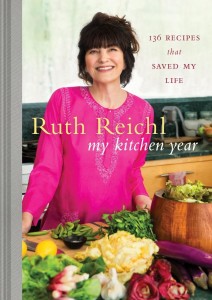 My Kitchen Year ~ 136 Recipes that Saved My Life by Ruth Reichl
My Kitchen Year ~ 136 Recipes that Saved My Life by Ruth Reichl
I’d been lusting after this book since it first came out. I was hoping it would come into the the bookstore where I work (and have a discount), but it never did. My friend and fellow foodie, Susan, already had the book and was full of yummy descriptions. I told her I had to have it and was just going to buy it – expense be damned. Then, a few days later, Susan announced she had come into an “extra” copy which she would give me. (I secretly suspect my dear friend actually bought it for me, but we’ll go with her story.)
From the book’s publicity blurb:
In the fall of 2009, the food world was rocked when Gourmet magazine was abruptly shuttered by its parent company. No one was more stunned by this unexpected turn of events than its beloved editor in chief, Ruth Reichl, who suddenly faced an uncertain professional future. As she struggled to process what had seemed unthinkable, Reichl turned to the one place that had always provided sanctuary. “I did what I always do when I’m confused, lonely, or frightened,” she writes. “I disappeared into the kitchen.”
Happily this is more than just a cookbook, although it is packed with (as the title states) 136 hunger-inducing recipes — what makes My Kitchen Year shine is Ms. Reichl’s personal writings, snippets from her journal, and musings on food interspersed between the recipes. She tells of the final weeks closing up the magazine, packing her office. Of going into Chinatown with her beloved fellow staffers for a final lunch at a favorite restaurant. And how can you not have a craving for chocolate cake when reading this passage?:
I needed an antidote to the poison of self-pity. What I needed, I decided, was to bake a chocolate cake. I emailed a few friends, asking them to tea. Why a cake? Because the precision of baking demands total attention. Why this cake (The Cake that Cures Everything)? Because the sheer size of it makes special demands. But most of all, because it is impossible to hold on to gloom with so much chocolate wafting its exuberant scent into every corner of the house.
Most everyone was saddened when Gourmet magazine suddenly stopped publication (I was a subscriber for over 15 years and am still in mourning) but, apparently, none of us were as astonished as Ms. Reichl, herself. She knew nothing of the decision and had, in fact, personally supervised the December issue which, sadly would never make it to press. How I would have liked to see that last issue. She ruefully describes how each magazine issue would have had multiple covers of beautifully photographed Christmas cookies.
Reeling, she escapes to her home in upstate NY …
I longed for the feel of knife in my hand, the heft of water splashing into a pot. Yearned for the joyous sizzle, burble, and hiss that are the ever-changing soundtrack of the kitchen. I missed the daily transformations: fruit ripening, dough rising, bread toasting into golden slabs. I’d always thought of these elemental pleasures as minor diversions, but now I understood they they’re the glue that holds my life together….in a world filled with no, it is my yes.
This long-time food writer and one time NY Times restaurant critic has made a career of haute cuisine. But here Ms. Reichl shares her appreciation (and recipes) for simple meals, often made with farmer market obtained fresh ingredients. She has eaten the world’s best food in the finest restaurants, yet upon bringing home spring’s first asparagus, she cooks it quickly, drizzles it with fine olive oil and eats the spears by hand while still standing at the stove.
Ms. Reichl uses food as a gift of love, not only for herself, but also for her friends and family. Whereas before, she would have gone to someplace fancy with lowered voices and expensive menus, now she entertains at home, serving her home-made meals around her table where everyone happily lingers, talking until the wee hours. She looks around and feels at peace and finally, at home.
In terms of a cookbook, the recipes are wonderful. Not overwritten with just the right amount of instruction. There are plenty of Asian inspired entries, but nothing too complicated. I just counted and I have pencil checked at least 25 in the index to try – Fresh Apricot Pie and Food Cart Curry Chicken are in the plans for the near future here in the Book Barmy kitchen.
I have read all of Ms. Reichl’s books (list HERE) and they range from her early childhood with a mother who was a horrible cook to one of my favorites Garlic and Sapphires which recounts her days as a restaurant critic (which often required donning various disguises). During the year after Gourmet, she also wrote a novel called Delicious – a fun plot which mimics her own experience — namely, the closing of a food magazine and the poor writer who stayed behind to answer all the on-going readers letters.
You don’t have to be a hard-core foodie, or a past subscriber to Gourmet Magazine to enjoy any of Ms. Reichl’s books. But, if you appreciate good cooking and delicious meals, do go ahead and treat yourself to your own copy of My Kitchen Year.
(Thank you Susan)
Browsings by Michael Dirda
 Browsings by Michael Dirda
Browsings by Michael Dirda
A Year of Reading, Collecting, and Living with Books
What prompts me gravitate to books about other books? They only add to my long lists and piles of books I want – nay, must read. It’s a sickness I tell you – a real sickness. You may remember this post, when, after doing the math, I soberly realized I’ll never read all the books I want to read. But like a moth on its death journey towards a hot light, here I go again. Send help…
I just finished reading Browsings, Michael Dirda’s collection of essays about – you guessed it — books and reading. Mr. Dirda, a weekly book columnist for the Washington Post, is no slouch, he received the Pulitzer Prize for distinguished literary criticism.
These essays come from his writings for The American Scholar. I’d never heard of this journal and after some sleuthing (OK, a bit of Google searching) it turns out to be the quarterly magazine of the Phi Beta Kappa Society. (No wonder I never heard of it. Way above my mental pay grade.) Lest you fear, these essays are down to earth, funny and nowhere near as pretentious as “The American Scholar”. Just read this from the back jacket cover:
He was once chosen by Washingtonian Magazine as one of the twenty-five smartest people in our nation’s capital – but, as Michael says, you have to consider the competition.
In the introduction, Mr. Dirda recommends reading his essays no more than a few at a time, and also reading them in order. I obeyed the first advice, but not the second. I admit I did leap around a bit, but in the end, I read them all. Browsings was my constant companion for that soothing half hour just before falling asleep.
The essays in Browsings are eclectic and seemingly random…from his sad musings of his mother’s nursing home to the loss of cursive penmanship – but the connective tissue is books, reading books, collecting books, finding books, talking about books and writing about books.
In fact, many of the essays are interspersed with reading lists (thus my ever expanding TBR titles). We share a fondness for Christmas books — he lists and summarizes his favorites – (taking notes, taking notes…)
Another essay starts with a rant against his local power company when he was without power for three days during a DC area heat wave.* By the third day, he blissfully escapes to a cooler, more northerly-located bookstore. Mr. Dirda, naturally summarizes the numerous books he acquired. (Come right this way folks, see the idiot making yet more lists of books…)
He has a love of older books – eschews bestsellers and feasts his eyes (and his wallet) on the vibrant dust-jackets of the 1940’s and 50’s. There’s a divine essay dedicated to the golden age of detective novels – trust me readers, you, too, will be jotting notes. Mr. Dirda, in another excerpt, reflects upon the bookshelves, favorite notebooks and writing implements of various great authors — what reader can’t resist picturing Colette writing with a beloved Parker fountain pen?
After reading an article about millionaire author and Law & Order producer David Wolf, who owns a home in Montecito, California — “where God would live if he had the money.” –he ponders excessive wealth and Tolstoy’s lament – “how much (land) does a man need?” Mr. Dirda reflects on his own excess — books:
It’s certainly not as though I need any more books. Just yesterday I was up in the attic creating neat stacks of those I would like to read Right Now.
Of course the author speaks fluent French and taught English in Marseille. He tells of a hunch-backed dwarf who cut hair in a garage, where one had to climb down into a pit so he could circle around and cut the hair. I don’t do the tale justice, you must read it for yourself.
When I read the following passage, I wondered if Mr. Dirda was a ghost here in my home office, silently judging me hunched over my computer:
…I’ve discovered, you have to get out, you do need to see other human beings. You can’t just read and write all day, much as I’d like to. After a few hours in a chair, my body grows achy, my brain feel even mushier than usual, my tired eyes start to hurt. To refresh myself I usually go for a walk, or if I’m feeling virtuous and resolute, I’ll hike over to the gym. (Thanks much, how to be superior Mr. Dirda.)
I just love this guy, he’s a charming, quirky book nerd. How could I not fall for a guy who dreams of traveling around North America in a van visiting secondhand bookstores. (Question, would a van be large enough for both of us and our book purchases? — Time to re-think the vehicle Mr. Dirda.)
After finishing the final essay, and in addition to the wildly optimistic new list of books I must want to read, I jotted down some quotes from Browsings – you bibliophiles out there will relate:
I also think of some books as my friends and I like to have them around. They brighten my life.
The world of books is bigger than the current best-seller list.
Books don’t furnish a room. A personal library is a reflection of who you are and who you want to be, of what you value and what you desire, of how much you know and how much more you’d like to know.
What fun it was to spend time each evening with a witty, engaging and off-the-charts-smart booklover whose reading covers a surprisingly wide breadth of interest and expertise.
Look for his other books which include Book by Book (own it), Classics for Pleasure (want it), and Readings (just got it).
(*N.B. He’s talking about Silver Spring, Maryland, where I grew up and summers were indeed brutal. I spent those hot, humid days with Nancy Drew in front of a cooling fan until I was forced to go out and play. That says a great deal don’t you think?)


